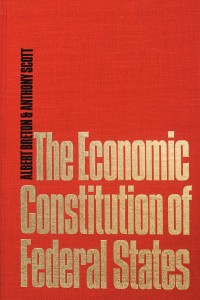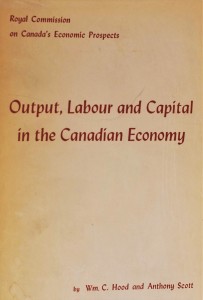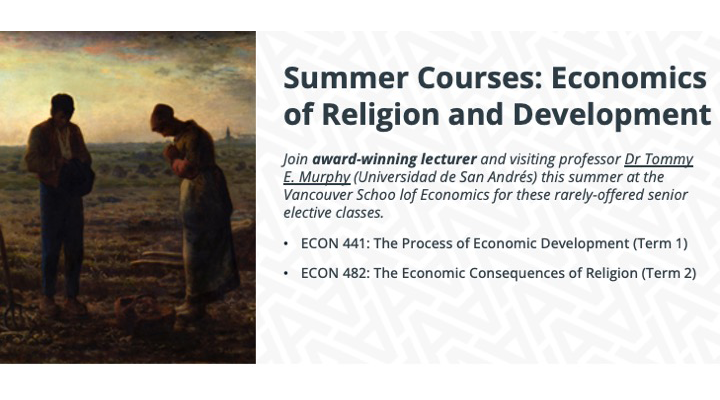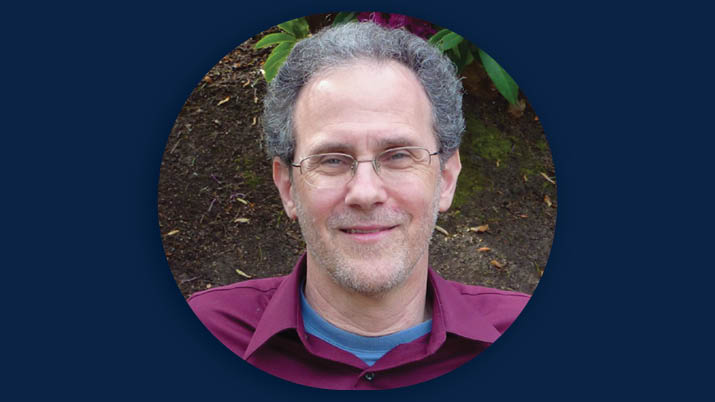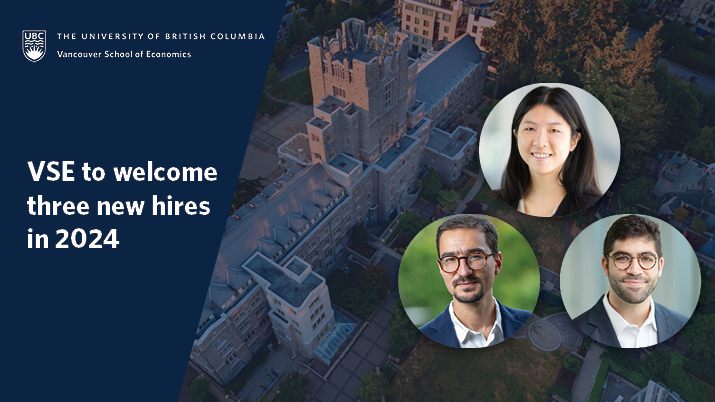Have you ever wondered what economics courses were like during the early beginnings of the University? Who were the professors and what was their research about? And, most importantly, who were the key builders of the UBC Economics institutional spine? We stepped into UBC’s past to tell you a bit more about what was happening in and outside of campus back then and how it affected the development of the Vancouver School of Economics.
Over One Hundred Years Later: Looking Back


The Iona Building, formerly Union College, pictured here in 1928. Additions over the years include the dormers, as well as the central tower and east wing that exist today.


The Iona Building in 2016 - now home to UBC's Vancouver School of Economics.
Theodore Boggs, Henry Angus, and the Origins of the School
The history of economics at UBC goes all the way back to UBC's beginnings in 1915 when the Department of Economics, Sociology, Commerce and Political Science was first established. As often with a project at the initial stages its early steps were cautious and only three economics courses were offered in the starting years. Furthermore, the first instructor, an economist named Mack Eastman, was officially hired as an assistant professor in the History department. However, matters consolidated and speeded up with the arrival of Theodore Boggs in 1917.
Having studied at both Acadia and Yale universities, Dr. Boggs brought in the academic experience and broad perspective that a newborn institution needed. In the following years, Henry F. Angus, who was later to become the intellectual architect of UBC's commerce faculty, joined the department and Boggs, as head of it, introduced a program leading to a master’s degree in economics. Unfortunately, the expansive plans of these two visionaries were hindered by a global economic catastrophe: the stock market crash of October 1929 and the ensuing ten-year Great Depression.


Theodore Boggs
The Impact of the Great Depression and the Second World War


Published 1961.
The ‘Black Tuesday Collapse’ not only involved a one-day loss of 14 billion but it also left thousands of people unemployed and hungry across all corners of North America. In particular, many of them were forced to emigrate to the West, in search of better opportunities and warmer landscapes, transforming the last stop, Vancouver, into a crowded and helpless city. The University was not isolated from this phenomenon and UBC’s financial budget was cut by more than half in the year following the catastrophe. As Boggs saw his resources shrink he went on to teach at Stanford, and Angus took over the lead of the Department in 1930.
Contrastingly to the slow recovery of financial markets, economic thought thrived during the ensuing years of the upheaval. At the same time Angus was settling into his new position as Department Head, economics as a field was changing. Econometrics became a relevant field in economics, John M. Keynes published his revolutionary macroeconomic ideas in "The General Theory of Employment, Interests and Money" and the Stockholm School of Economics was founded. Determined to bring some of this new thinking into UBC’s economics curriculum Angus hired new professors, including Joseph Crumb, Stewart Jamieson and George Drummond, to teach courses on Labor Economics and Money & Banking outside of the, by then famous, Economics 200 core course. However, the world was yet to experience another major political and economic quiver that would affect almost every institution in irrevocable ways.
Adolf Hitler’s invasion of Poland marked the beginning of WWII and set in motion an international combat that would shape the direction of humanity. Japan’s bombing of Pearl Harbor and the subsequent ‘War Measure Act’ that order the internment and property confiscation of over 21,000 Japanese Canadians in B.C. led to racial divisions among citizens. As a UBC representative and Special Assistant to the Secretary of State for External Affairs, Henry F. Angus opposed the Japanese Canadian internment. The end of the war in 1944 inaugurated an era of worldwide collaboration.
The despicable war crimes committed during World War II urged the creation of a worldwide set of institutions, such as the International Monetary Fund, the World Bank and the United Nations, that aimed to ensure universal peace building and economic recovery after the conflict. To properly and collectively ameliorate the status quo it was essential to understand the mechanisms that fueled these institutions. Economics offered a good set of lenses to leverage in learning about the complexities of the newly re-established world. Angus understood this and mobilized resources so that the number of economics courses offered at the Department elevated to 21 by 1951. This not only strengthened the presence of economics at UBC but it also provided more academic options for the increasing student population.
Increasing Enrolment and the Arrival of New, Globally-focused Faculty
From numbers oscillating between 2,000 and 2,500 students per year before WWII, enrolment escalated to 9,400 after the war as veterans moved into the classrooms. Some of the economics students of the time and ensuing years included Nobel Laureate in Economics Robert Mundell, economic historian Ian Drummond (who was also the son of the UBC Honors Seminar Economics Professor at the time, George Drummond), and UBC Professor Emeritus Ronald Shearer, among others. But the student population was not the only one to increase, the numbers of active professors at the University also incremented.
By 1952 the UBC Department of Economics, Sociology and Political Science had separated from Commerce, which went on to become a department by itself in 1950, and welcomed new professors to his ranks like Soviet refugee and London School of Economics graduate, Hans Ronimois, Robert Clark, a Harvard graduate and disciple of Schumpeter, and John Mars, a visiting professor from the University of Manchester. The latter turned out to be one of the most intellectually inspiring members of the Department according to Ronald Shearer, his student at the time. Mars not only enlightened his audience with some of the leading topics of Macroeconomics of the day but he also exposed them to something beyond the basics of the discipline. His teaching, and Tony Scott’s arrival to UBC in 1952, marked the beginning of profound and empirical economic questioning with a global focus in the Department.
- Written by Albert Breton and Tony Scott, published 1978.
- Written by W.C. Hood and Tony Scott, published in 1957.
Economics as a Platform for Examining
Social Issues


Rally in support of the 'back the mac' campaign to support higher education, UBC, 1963.
Civil and women’s rights movements, Greenpeace, anti-war demonstrations, a walk on the moon... the sixties arrived with the soundtrack of the Beatles and a global fear of a Cold War escalation. In less than 10 years the political and economic tensions between the capitalist West and communist Russia gave way to a missile crisis, a martial intervention in Vietnam and massive global demonstrations opposing the latter. People were tired of conforming to endless bombing and society’s unequal treatment of women and people of colour. An era of enquiry had begun.
The demand for governmental and societal responses was rooted at universities and UBC was no exception. The sixties confirmed the consolidation of UBC as an educational institution and marked the beginning of its commitment to research excellence. To do so, however, it needed capital. Suggested by W.A.C Bennet, the 25th Premier of British Columbia, UBC, along with SFU and UVIC, joined forces to initiate the “3 Universities Coquitlam Fund Campaign” in order to raise $28 million to finance research and expansion programs for meeting the increasing student capacity. The unprecedented success of the campaign, which garnered $19 million by its first year, corroborated society’s need for answers to world problems.
Many of those issues were, in fact, tied to economics and UBC's Department of Economics and Political Science not only saw a steady increase in its student population but it also began a multitude of research projects on areas like environmental economics and growth theory. The efforts of Anthony Scott to transform the Department into a global reference centre for research were continued by his successors: initially, Milton Moore, whose work focused in microeconomic theory and industrial organization; and, later on, Ronald A. Shearer, an expert in economic growth theory.
The Arrival of Gordon Munro, John Helliwell and Erwin Diewert


Published in 1974.
UBC had by then more than twenty economics professors, including Gordon R. Munro and John Helliwell - who both would later become renowned economists for their study of the economic management of world fishery resources and social capital, respectively. Classes on econometrics, economic development, government finance, industrial organization, history of economic analysis and labour and welfare economics were offered at the undergraduate and graduate level.
But the Department had yet to welcome one of its best contributors and a leading mind in the study of economic measurement. In 1970, the same year UBC became the first university in Canada to offer a women’s study program for academic credit, and students in 12 faculties were represented in the University’s senate for the first time, Walter Erwin Diewert joined UBC as an economics professor.
Born and raised in Vancouver, W. Erwin Diewert had attended UBC to complete a B.A. degree in 1963, and a M.A. in Mathematics in 1964. Initially he was interested in the study of physics but soon decided to shift to mathematics as he discovered the latter was essential for understanding the former. However, after finding out about the mathematical structure of economics he decided to drop the physics content of his degree and take economics courses instead. Encouraged by one of his economics professor at the time, Milton Moore, who headed the Department from 1969 to 1973, he went on to complete his graduate studies in economics at the University of California at Berkeley. Finishing in 1968 he taught at the University of Chicago for a couple of years before returning to UBC.
Erwin’s research originated from a personal quest to develop tools for economic modeling and measuring that would help understand and analyze real world economic problems. For this purpose he continuously involved, and still does, with empirical researchers, government agencies, and private and public enterprises. His contributions to the field of econometrics have been awarded with fellowships to the Canadian and the American Economics Associations as well as to the Academy of the Social Sciences in Australia. Furthermore, he has not only produced an extensive body of academic publications but he has also collaborated in different consulting-related reports (including a report to the New Zealand Business Roundtable) published by varying agencies such as the World Bank.
Although he has developed work in different areas throughout the years his main research has been focus on flexible functional forms, the implications of maximizing behaviour, welfare economics and applied general equilibrium modeling, and index numbers. Some of the technical terms he coined in several of his studies, like the concepts of flexible functional forms and superlative index formulae have become part of the growing economic literature.
He first became interested in flexible functional forms while a master student at Berkeley. Erwin was struck by the fact that the three main functional forms used for production and utility functions when doing empirical work (the Leontief, the Cobb-Douglas and the Constant Elasticity of Substitution functional forms) had one common defect: they could only approximate an arbitrary utility to the first order. Thus the derived demand or supply functions that these functional forms generate in order to predict responses to, for example, an increase in taxes, is an inaccurate approximation. He thought that to improve our predictions we needed to use functional forms that could provide a second order approximation to an arbitrary utility or production function. These are what he named ‘flexible’ functions. However, it was not easy to come up with adequate ‘flexible’ functions and to this day Erwin continues on working on flexibility problems with some of his former students at UBC.


Written by Mukesh Eswaran, published in 2014.
And an impressive group of former students they are - now renowned economists themselves, several of whom are professors of the now-renamed (in 2012) department, UBC’s Vancouver School of Economics: Paul Beaudry, Brian Copeland, Mukesh Eswaran, Nicole Fortin and Henry Siu. Furthermore, despite research taking up most of his time these days, Erwin still teaches two graduate courses: Economics 580 (Economic Measurement—basically index number theory) and Economics 594 (Applied Economics).
Start of the Woodward Series and Development of a Renewed Focus on Teaching


Published 1981.
Teaching excellence has always been an important goal of the Department of Economics since Erwin joined in the '70s. At this time two department heads: John G. Cragg, an expert in securities, and Samuel P. S. Ho, a development economist, knew the path to academic excellence was of a dual nature. Fine research was as essential as effective teaching. Thus, in 1978, they placed special emphasis in coming up with an extensive and accurate teaching evaluation system. Furthermore, they also increased significantly the visiting appointments for the academic year and began the Woodward Lecture Event Series.
Thanks to the generosity of Eugene Woodward, a successful Canadian journalist, UBC established a series of annual lectures with the purpose of bringing forward fresh approaches to contemporary economic problems and institutions. Beginning in 1983 with Richard G. Lipsey, a Queen’s University expert in inflation wars, the series continues to host an array of different leading economic researchers including the famous macroeconomists and Nobel Prize Laureates Paul Krugman and George Akerlof.


Published 1986.
Economic ideas and concepts were being exchanged at the Department like never before. Scott’s vision of UBC as a leading research and academic institution had finally started to become real. The number of economics professors was increasing year by year and so did the volume of research projects in the department. Globalization, along with the internet era, was waiting in the corner to change people’s lives in unprecedented ways. Economics seemed like a useful set of tools to investigate and understand these changes. Perhaps The Beatles should have sung, “All you need is love… and economics.”
The arrival of the 21st century brought a new wave of growth to UBC. The University not only consolidated as a leading educational institution but it also expanded its frontiers to other parts of British Columbia and the world. The previous decade had seen the opening of the First Nations Longhouse, built in consultation with the Musqueam community. The new century bore witness to the opening of UBC Robson Square in Downtown Vancouver and the founding of the UBC Okanagan campus in Kelowna.
Acknowledging the importance of a strong relationship between the students’ community and the indigenous people of the southern interior of B.C., the new UBC campus academic plan was based on four themes: indigenous studies, sustainability, health and wellness and creativity. Knowledge was not created to be stored in an ivory tower but, instead, it should be accessible to as many as possible.
This influx of growth also reached the Department of Economics and the following decade came full of positive changes and expansions. By the end of this decade the Department had hired a significant number of new researchers, such as Thomas Lemieux, a specialist in wage inequality; Nicole Fortin, whose research specialities include focusing on the economic progress of women, gender equality policies, and gender issues in education; and behavioural economist Yoram Halevy, who would later start the Experimental Lab (ELVSE) at UBC. This new recruitment was partly due to the increase in the number of economics students, but also due to the retirement of some long-standing professors. Examples include Geoffrey Hainsworth, a development economist with expertise in South East Asia, and Gordon Munro, an environmental resources specialist (who still teaches on a course-by-course basis). In fact, Gordon is still very active in research and the economics community and continues to accumulate honours for his contributions, including recently being named a Fellow of the International Institute of Fisheries Economics and Trade, and receiving a rare award for an economist, the Vancouver Aquarium Award.
Before the nineties ended, and under the supervision of Ashok Kotwal, then Head of the Department, the Graduate School of Economics had also been established in collaboration with the Business Strategy Division of the Faculty of Commerce. At an undergraduate level new exciting programs had been introduced. Students could now obtain a combined major in Economics and Mathematics, Philosophy, Political Science or Statistics.


Written by Mauricio Drelichman, published in 2014.
At this time, the Department started to be internationally recognized for the quality and diversity of its research. Several economics professors were distinguished for their contributions to their respective fields of study. Firstly, Paul Beaudry, who had joined the Department in 1994, was invited to become a Fellow of the U.S. National Bureau of Economic Research for his study of Contract Theory, Labour Economics, Monetary Economics and general Macroeconomics. Secondly, Robert Evans, one of the founders of Health Economics and a pioneer in the investigation of universal healthcare insurance financed by taxes was asked to serve as the Director of the Program in Population Health at the Canadian Institute for Advanced Research. Thirdly, John Helliwell was bestowed the Doug Purvis Memorial Prize, an award that recognizes the best policy research publication of the year, for his book How Much Do National Borders Matter? Furthermore, he was also invited to become a Fellow of the Royal Society of Canada for his work on international finance, social capital and price gaps across borders. John’s list of accolades and awards continues to expand to this day, including his pioneering research into happiness and his work as co-editor of the groundbreaking World Happiness Reports.
However, those were not the only professors from the Department acknowledged for their work. Robert Allen, an economic historian specialized in the Soviet industrial revolution, Angela Redish, a monetary expert and a visiting economist advisor in the Bank of Canada, and Guofu Tan, an applied microtheorist working on HUB networks, were also awarded different distinctions. Moreover, it is also important to highlight some of the original research going on in the Department at the time like Brian Copeland’s study of the environmental implications of International Trade, Ken Hendricks work on Vertical Mergers: Theory and Policy, and the collaborative work of David Green and Beaudry on Technological Progress, Growth and Income Distribution.
From that point onwards the diversity of the projects expanded significantly thanks to an increase in the number of faculty members, seventy five in 2015, and the volume of students doubled with the incorporation of new academic programs. Angela Redish, Brian Copeland and David Green worked incessantly during their time as Heads of the Department to bring into UBC some of the most innovative economic and educational thinking happening across the various frontiers of the field. Recent notable research includes the work of Siwan Anderson, whose recent projects include ground-breaking research into missing women in developing countries. Faculty and students of the School continue to earn numerous awards and accolades for their work.
Indeed, the aforementioned Woodward Lecture Series have continued on bringing to campus some of the best contemporary economic approaches to world problems. Speakers like Michael Kremer, a Development Economist from Harvard University; Daron Acemoglu, a MIT Political and Development Economist famous for co-writing Why Nations Fail? with historian James Robinson; and Alvin Roth, a Nobel Laureate who has worked extensively on different kinds of economic transactions, have shared their work and ideas with economics students at UBC.


Co-editors are VSE's Craig Riddell and David Green (along with France St-Hilaire of the IRPP), with chapters by Nicole Fortin and Thomas Lemieux. Published in 2016.
Sharing ideas and creating a meaningful impact on the world through the implementation of innovative thought was also the motto of 2011 UBC’s ‘Start an Evolution’ movement. The biggest fundraising campaign of UBC’s history aimed to double the number of active alumni connections and raise $1.5 billion to enhance student learning, broaden its community engagement activities and enlarge its research capacity. The movement had an impact across campus and Economics was no exception. In 2012 the Department evolved into the Vancouver School of Economics and Michael Devereux, an international macroeconomist, became its first Director, followed by Thomas Lemieux - both of whom continue the tradition of devotion of service in the job as did the former Heads. In 2013, the Bachelor of International Economics (BIE) Program, a 4-year direct entry program, with a initial cohort of 85 bright and motivated Canadian and international students, was launched. Ashok Kotwal was the inaugural BIE Director, with Historical Economist Mauricio Drelichman now leading the degree program. With a curriculum focused on international economic issues including courses offered in partnership with the Sauder School of Business, the mission of the program was to teach contemporary young citizens not only the tools of economics – theoretical and empirical skills – but also how to use those tools to analyze the operation of the complex global economy in which we all live and work. The program was a success from the start with over 2,000 applications for the 85 seats, and has quickly become one of the most popular programs at UBC for potential student applications.
The metamorphosis to a school was completed in January 2016 with the relocation of the economics unit to the iconic Iona Building - a new space for the students, faculty and staff and a new 'face' for the School.
A new chapter awaits writing with the appointment of Erik Snowberg as a Canadian Excellence Research Chair (CERC) in Economics at VSE, and plans to launch in 2017 a new research centre to explore the use of innovative data in economics, to be housed at the School.
